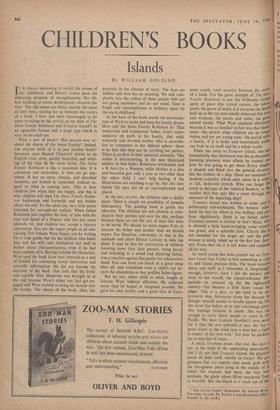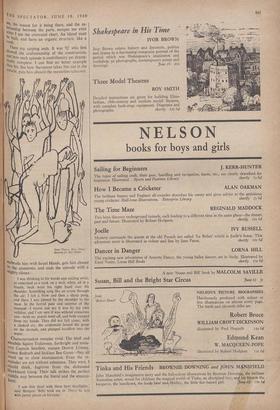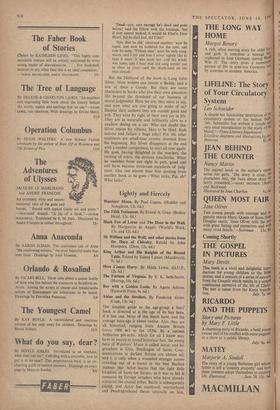CHILDREN'S BOOKS
Islands
By WILLIAM GOLDING
Iis always interesting to revisit the scenes of lour childhood, and literary scenes have the endearing property of changelessness. No rib- bon building or estate development obscures the view. The old scenes are there, exactly the same as they were, waiting for us between the covers of a book. 1 have just been encouraged to do some revisiting by the arrival on my desk of The Swiss Family Robinson and Treasure Island*, in an agreeable format and a large type which is easy on the adult eye.
What a pair of books! Has anyone ever re- sisted the charm of the Swiss Family? Indeed, can anyone think of it as just another book? Someone once likened Chaucer's stories to an English river, slow, quietly beautiful, and wind- ing all the way. In the same terms, The Swiss Family Robinson is like a mountain lake. It is contained and motionless. It does not go any- where. It has no story. Details, and detached incidents, are looked at separately without re- gard to what is coming next. This is how children live when they are happy, and this is why children will read 7'he Swiss Family Robin- son backwards and forwards and not bother about the end. To the adult eye, very little seems intended for out-and-out realism. When father Robinson puts together his boat of tubs with the ease and speed of a Popeye who has just eaten spinach, we, and children too, accept a literary convention. Nor are the vague people at all con- vincing. For Johann Wyss began, not by writing for a wide public but for his children who knew him and his wife and themselves too well to bother about characterisation, even if he had been capable of it. Having isolated his characters, Wyss used the book from then onwards as a sort of holdall for conveying moral instruction and scientific information. He did not foresee the outcome of the book. One feels that the lively and capable Miss Montrose was brought in at the end because Wyss's eldest son had got en- gaged and Wyss wanted to bring his fiancée into the family. The charm of the book, then, lies
precisely in the absence of story. The days are endless and time has no meaning. We sink com- pletely into the milieu of these people who are not going anywhere and do not mind. Time is bright and uncomplicated as holidays spent by the sea in childhood.
At the back of the book stands the determina- tion of Wyss to make and keep his family secure. How safe the Swiss Family Robinson is! That omniscient and omnipotent father, God's repre- sentative on earth to his family; that mild, womanly and devoted mother who is neverthe- less so competent in her defined sphere—there is no hint that they can be anything but perfect. There is no flaw in their parental authority. This makes it disconcerting, in the new illustrated edition, to find father Robinson red-headed, and a fit hero for a Western, while Mother is a slim and beautiful girl, only a year or two older than her eldest child. I can't help feeling, if the illustrations are anything to go by, that this time family life may not be so uncomplicated and placid.
In the text, as ever, the children take a child's place. There is simply no possibility of juvenile delinquency. The guiding hand is gentle but adamant. The children are not allowed to over- shadow their parents and save the day, perhaps because these are not the sort of days that have to be saved. We should no more expect Fritz to succour his father and mother than we should expect Jim Hawkins, conversely, to stay in the stockade and allow Doctor Livesey to take top place. It may be that the convention of children knowing more than their parents, being heroic and returning to a saved and admiring father, was a reaction against that gentle but adamantine hand. You can have too much of a good thing after all; and sometimes even a child's eye de- tects the absurdities in that godlike father-figure.
But no one, either child or adult, laughs at Johann Wyss without affection. He achieved more than he hoped or imagined possible. He gave his own family, and a good slice of Euro- pean youth, total security between the covers of a book. For the great strength of The Swiss Fancily Robinson is not the brilliantly evoked spirit of place (the crystal cavern, the lobster', pools, the grove of trees); it is not even the details held up to the eye and exactly observed (the tools and weapons, the plants and rocks, the good' earned meals). What Wyss captured effortlessly because it was so familiar to him was that family sense—the period when children are no longer babies and not yet young men; the period when a family, if it is lucky and emotionally stable, can look in on itself and be a whole world.
When one turns to Treasure Island, one sees immediately that Stevenson was the professional, knowing precisely what effects he wanted and how he was going to get them. Every chapter is shaped and fitted into the general structure, like the timbers of a ship. There are moments 0' lambent actuality which only come to a writer at full, dedicated stretch. Who can forget the notch in the sign of the Admiral Benbow, or the musket shot that spat like a curse through the mainsail of the departing ship? Treasure Island was written to order and i5 deliberately sub-adolescent. `No women,' stiPa. lated the boy for whom it was written; and Per' haps significantly, there is no father either. Feminine interest is limited to Jim's Mum, who is allowed a little hand-wringing, some tremal' ous greed, and a splendid faint. Clearly she is not intended for the larger air, and the punr woman is nicely tidied up in the first few char ters. From then on, it is salt water and cutlasses all the way.
So much praise has been poured out on Tree' sure Island that I tried to find something to carp at; and found precious little. The book remains sharp and swift as I remember it. SurprisinglY enough, however, since I left the nursery add went to sea myself, the topsail-schooner His- paniola--an unusual rig for the eighteenth century—has become a little fuzzy round the edges. This is a pity, as she used to be nlY favourite ship. Stevenson chose her because be thought himself unable to handle square-rig; but she never lies before us in one convincing piece. Her tonnage remains in doubt. She was big enough to carry thirty people or more to the Pacific. We have Captain Smollett's own word for it that she was splendid at sea; she `lay a point closer to the wind than a man has a right to expect of his own wife.' Yet later he anchors her in nine feet of water. A small, frivolous point, that one. But dare I say, in the teeth of the applauding generations, that 1 do not find Treasure Island, the physical patch of land itself, wholly in focus? We get glimpses that are superb; that sandy gash with the two-guinea piece lying in the middle of it, where the treasure had been, the fort and stockade, the glade where Silver murdered Toll so horribly. But the island as it stuck out of the *THE Swiss FAMILY ROBINSON. By Johann WYO. TREASURE ISLAND. By Robert Louis Stevenson. (Mae donald, 7s. 6d. each.) isea, the reason for it being there, and the re- lationship between the parts, escapes me even when I use the overrated chart. An island must be built, and have an organic structure, like a tooth.
She my carping ends. It was 'Q' who first show—co,
the craftsmanship of the construction,
and how each episode is contributory yet drama- tically complete. I can find no better example than his. See -how Stevenson takes Jim out in the °41ole, puts him aboard the masterless schooner, embroils him with Israel Hands, gets him chased 1Q the crosstrees, and ends the episode with a 'nighty climax :
I was drinking in his words and smiling away, as conceited as a cock on a wall, when, all in a breath, back went his right hand over his shoulder. Something sang like an arrow through the air; I felt a blow and then a sharp pang, and there I was pinned by the shoulder to the mast. In the horrid pain and surprise of the moment—I scarce can say it was by my own volition, and 1 am sure it was without conscious aim—both my pistols went off, and both escaped from my hands. They did not fall alone; with a choked cry, the cockswain loosed his grasp on the shrouds, and plunged headfirst into the water.
Characterisation remains vivid. The bluff and unsubtle Squire Trelawney, forthright and mina- tory Captain Smollett, mature Doctor Livesey, honest Redruth and feckless Ben Gunn—they all stand up to close examination. Even the re- mainder are not without substance. They were, I should think, fugitives from the . disbanded Ilawkhurst Gang. Their talk strikes the perfect middle way between the literal and the emascu- lated.
'I saw him dead with these here deadlights,' said Morgan. 'Billy took me in. There he laid with penny pieces on his eyes.'
Dead—aye, sure enough he's dead and gone below,' said the fellow with the bandage; 'but if ever sperrit walked, it would be Flint's. Dear Heart, but he died bad, did Flint !'
'Aye, that he did,' observed another; 'now he raged, and now he hollered for the rum, and now he sang. "Fifteen men" were his only song, mates, and I tell you true I never rightly like to hear it since. It was main hot, and the windy was open, and I hear that old song comin' out as clear as clear—and the death-haul on the man already.'
But the lifeblood of the book is Long John Silver. Most writers can invent a Baddy, and a few of them a Goody. But there are some characters in books who live their own abundant life beyond the threshold of our business of moral judgments. Here we are, they seem to say, and now what are you going to make of us? Despite their authors they are outside good and evil. They exist by right of their own joy in life. They are as naturally and brilliantly alive as a swallow diving on a cat. Who can doubt that Silver enjoys his villainy, likes to be liked, finds success and failure a huge joke? For the other mutineers are small-time crooks, doomed from the beginning. But Silver disappears at the end with a modest competence, to start all over again. He goes, having delighted in the murders, the turning of coats, the devious treacheries. When he vanishes from our sight in port, good and evil have become irrelevant standards of judg- ment. One can almost hear him quoting from another book as he goes—'What larks, Pip, eh? What larks!'












































 Previous page
Previous page